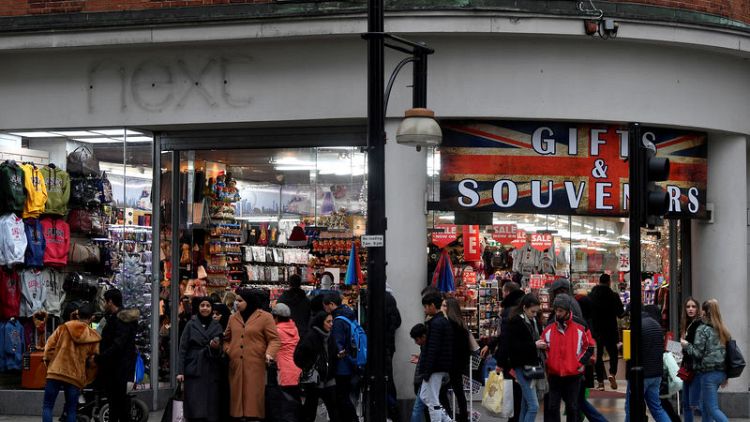By David Milliken
LONDON (Reuters) - British consumers remained their gloomiest in five-and-a-half years this month as a small improvement in their personal finances offset growing concern about the outlook for the next 12 months, when Britain is due to leave the European Union.
The GfK consumer confidence index held at -14 in January, its lowest since July 2013. Economists taking part in a Reuters poll had expected a slight fall to -15.
Businesses also gave a sobering outlook in surveys published on Thursday by the Confederation of British Industry and Lloyds Bank.
The GfK survey showed households' assessment of their personal finances improved due to falling inflation and higher wages and employment. But their outlook on the economy over the next 12 months was the weakest since December 2011.
"Consumers, companies and corporations thrive on certainty, which is in short supply just two months before the planned date for the UK's EU exit," GfK executive Joe Staton said.
Faced with deep opposition to her Brexit plan within her own Conservative Party, Prime Minister Theresa May wants to renegotiate part of withdrawal agreement she struck with the EU, less than two months before Britain is due to leave the bloc.
Without a deal that is acceptable to both sides, Britain risks a disorderly exit from the EU on March 29 which businesses have warned could lead to widespread economic disruption and potential shortages of imported food and medicines.
The Confederation of British Industry said small businesses reported the sharpest decline in sentiment about exports since the financial crisis, despite above-average output growth in recent months.
"Uncertainty in the domestic and global trading environment is clearly hitting manufacturing SMEs hard, with sentiment falling, concerns over political and economic conditions abroad spiking and investment plans still well down on the past year," CBI economist Alpesh Paleja said.
Political or economic conditions abroad were named as the biggest challenge to exports over the next three months since the survey began in 1988.
The survey by Lloyds Bank showed a small rise in business sentiment this month, after it hit its lowest since June 2016's Brexit referendum in December.
The GfK survey, carried out on behalf of the European Commission, was conducted between Jan. 1 and 15, while the CBI survey was based on responses from Dec. 17 to Jan. 11 and the Lloyds data came between Jan. 2 and 16.
(Reporting by David Milliken; Editing by William Schomberg)



